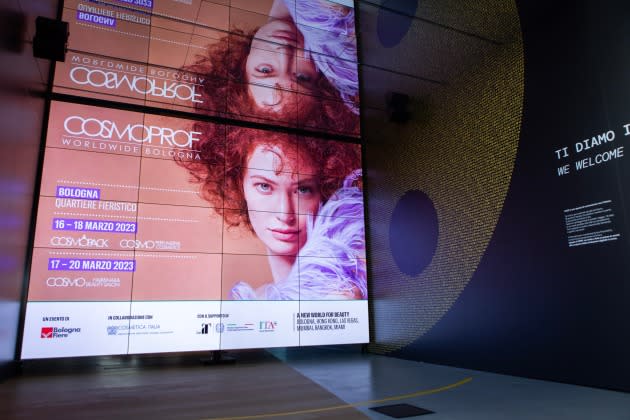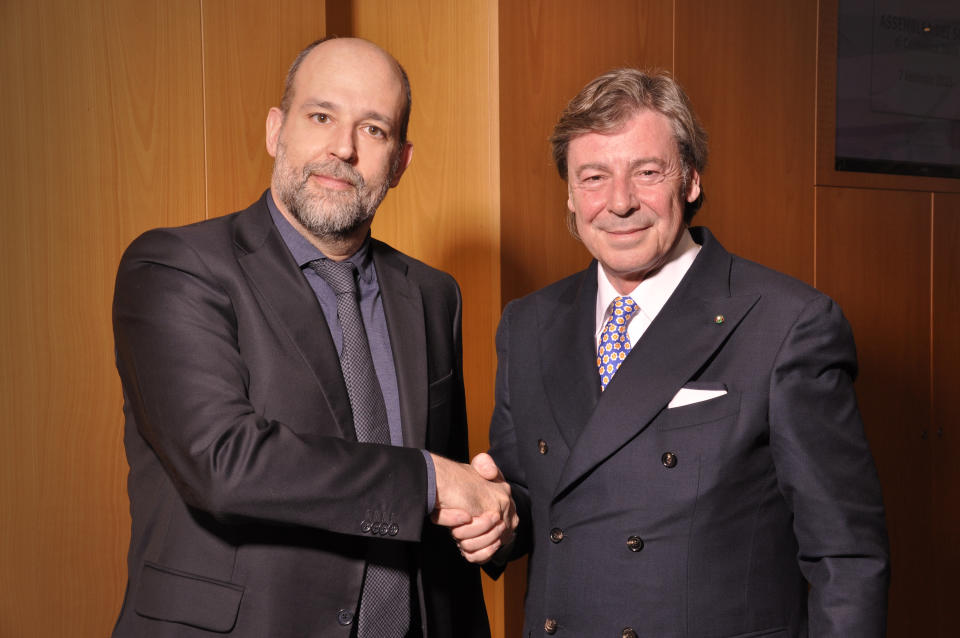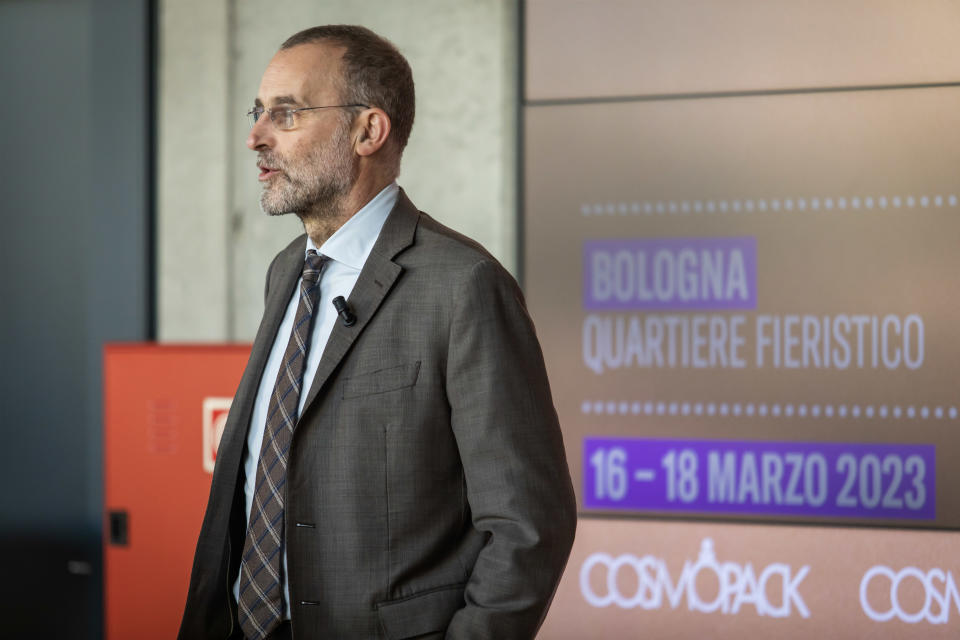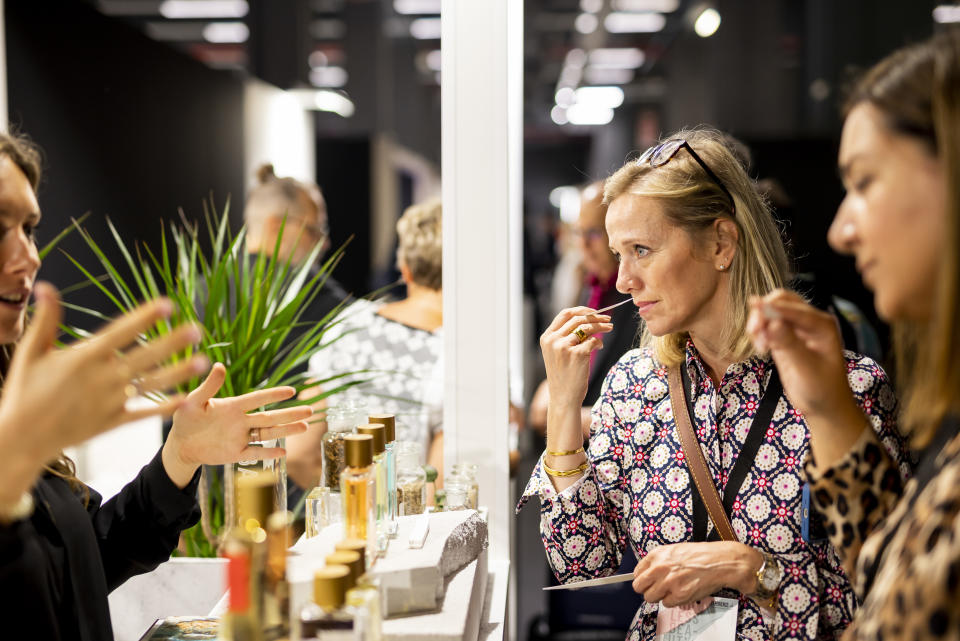Italian Beauty’s Momentum to Propel Bullish Edition of Cosmoprof Worldwide Bologna

MILAN — Italy’s beauty industry grew beyond pre-pandemic levels in 2022, and things are looking bright for this year, too.
According to preliminary figures released by the national association Cosmetica Italia on Thursday, total beauty sales in 2022 grew 11.4 percent to 13.2 billion euros compared to 2021 and surpassed the industry’s performance in 2019, when revenues roughly reached 12 billion euros.
More from WWD
“We reached the turning point,” said the organization’s president Benedetto Lavino, who has just been tasked to succeed Renato Ancorotti in the role. Executive president of Bottega Verde and vice president of the association since 2011, Lavino has a mandate until 2024 and named a new team of vice presidents to guide the organization, including Filippo De Caterina, director of corporate affairs and engagement of L’Oréal Italia; Fabio Franchina, president of Framesi; Filippo Manucci, global senior vice president of skin, hair, personal care and fragrances at Intercos Group, and Ambra Martone, who helms ICR Industrie Cosmetiche Riunite with her father Roberto and is already president of the Accademia del Profumo association.
“Projections for 2023 also point to a positive dynamic, forecasting a 7.7 percent increase to 14.2 billion euros in sales,” noted Lavino. “Different elements drive this performance, from growth reported across all distribution channels to the one registered by third-party manufacturers. The latter generated sales for more than 1.8 billion euros last year, up 8.5 percent compared to 2021 and projected to further grow 7.6 percent in 2023.”
Exports of Italian beauty products also hit record numbers in 2022, accounting for 42 percent of total revenues with 5.6 billion euros, up 15.8 percent compared to 2021. “This of course has a huge impact on the overall competitiveness of the country, showing how much the cosmetic industry is beneficial to the national economy,” underscored Lavino. Projections for this year show a 10 percent growth in exports for a total of 6.2 billion euros.
The mass market retained its role as main distribution channel of beauty goods in the country, accounting for 42.5 percent of total sales in 2022, when it grew 8.2 percent versus 2021. It was followed by perfumeries, accounting for 18.9 percent of total sales and reporting a 16.2 percent increase. Sales in this channel are seen to further grow 11 percent in the first six months of 2023.
Pharmacies were the third channel in the country, followed by e-commerce. Online sales totaled 1 billion euros last year, up 13.4 percent versus 2021 and expected to increase 12 percent in the first half of 2023.
Despite the encouraging numbers, Lavino underscored that Italian beauty companies are facing different challenges, including sourcing raw materials, increased material prices as well as spiking energy costs.
The new president reiterated his commitment in continuing the work of Ancorotti, who urged institutions to acknowledge the industry’s key role in the national economic tissue since the beginning of its mandate in 2018.

“Now more than ever, it’s essential to create a system to affirm the economic, scientific and social value of the cosmetic product,” said Lavino, adding “we will ensure that Italian and European institutions increasingly look at this with interest and awareness.”
“In the coming months, we will share data on the overall value generated by our sector throughout the whole supply chain,” he continued, teasing a new study compiled in partnership with Althesys to be presented to institutions at Cosmetica Italia’s public assembly in Rome on Feb. 28.
Following the milestone event, leading trade show Cosmoprof Worldwide Bologna is next on the Italian beauty agenda. Running March 16 to 20, the fair is set to host a bullish edition, reporting a 11 percent increase in number of exhibitors versus 2022. More than 2,900 companies hailing from 64 countries — 40 percent of which are from outside Europe — will gather in Bologna, while pre-registered visitors will come from 116 countries.
The fair will also feature 29 country pavilions, including Argentina, Australia, India and Romania, which are joining the trade show for the first time.
According to organizers, the increase in exhibitors’ attendance is strongly driven by the return to the event of companies from China and Taiwan, which have skipped the last couple of editions due to COVID-19 limitations, as well as a revamp of the fairgrounds.
“Up to now the results foreshadow a successful edition,” said Enrico Zannini, general director of BolognaFiere Cosmoprof in a dedicated press conference earlier this week. “We are registering better results compared to the 2019 edition and registrations from outside Italy are growing significantly,” he added.

In terms of layout, the fair will continue to allocate different areas and dates to different categories.
Running March 16 to 18, cosmetics packaging trade show Cosmopack will report a 16 percent increase in number of exhibitors versus 2022. These will account for 17 percent of companies out of total exhibitors at the show and include international firms from different parts of the supply chain, such as contract manufacturing and private labels, process and packaging machinery, primary and secondary packaging, applicators, ingredients and raw materials.
In particular, one of the novelties of the show’s 54th edition is the Ingredients Zone hall, gathering producers and distributors of raw materials, active principles and functional ingredients, essential oils, fragrances and formulation services.
Concurrently with Cosmopack, Cosmo Perfumery & Cosmetics will report an 8 percent growth in number of exhibitors, which include makeup, skin care and fragrance brands operating in the mass-market, prestige and masstige sectors. These will account for almost half of total companies showing at the fair and will include indie brands that will be spotlighted in the Extraordinary Gallery area, as in preview editions.
Introduced last year, the Beauty Tech hall will also make a comeback to highlight innovative technologies, apps, product solutions and sales tools for the beauty industry, developed by firms hailing from Croatia, India, South Korea, Slovakia, Taiwan and Turkey.
Opening a day after and running until March 20, the Cosmo Hair & Nail & Beauty Salon will also see a robust growth in attendance, up 23 percent versus last year. Specialized in products and services for the professional channel, these exhibitors will account for 38 percent of total companies at the show.
In addition to a busy schedule of CosmoTalks roundtables, live beauty demonstrations, hair shows and workshops, the Cosmoprof & Cosmopack Awards will be bestowed as per tradition, except this time a dedicated gala ceremony will be hosted at the Palazzo Re Enzo location in Bologna’s city center on March 17.
The prizes will include the Lifetime Achievement Award honoring entrepreneurs who have distinguished themselves for talent and tenacity and provided a key contribution to the evolution of the cosmetics industry. This edition, the accolade will go to Hamed Nazih, founder and chief executive officer of Nazih Group, a distributor of products, services and furniture specific for salons and spa professionals. Since 1975, Nazih has distributed more than 100 international beauty brands, through a network encompassing 21 countries across Europe, Canada and the Middle East and North Africa region.

Conversely to last year, Cosmoprof Worldwide Bologna won’t be closely followed by the Milano Beauty Week, whose sophomore edition has been shifted to September.
A brainchild of Cosmetica Italia in collaboration with the Cosmoprof and Esxence trade shows, the consumer-facing event was introduced last year with the mission of further creating awareness around the social and economic role the national cosmetic industry plays in the country.
The original idea was to create a unique momentum for beauty in the country, with a succession of the Bologna trade show, the events in Milan and the Esxence show dedicated to niche perfumery, but this year the Milan Beauty Week is slated to follow the city’s fashion week, instead.
Meanwhile, the Esxence show will return at the Allianz MiCo-Milano Convention Centre venue to stage its 13th edition. Running from March 30 to April 2, the event will showcase 280 exhibitors from 30 countries, including new entries such as Kazakhstan, Ukraine, Romania and Croatia. Companies will be divided into the two Main Brands and Spotlights sections, the latter of which is showcasing emerging players. Still keeping a limited incidence on total revenues, in Italy the artisanal perfumery segment is growing slowly but steadily, reaching 310 million euros in sales last year.
Best of WWD


